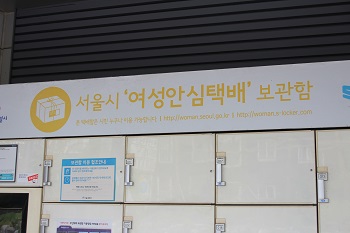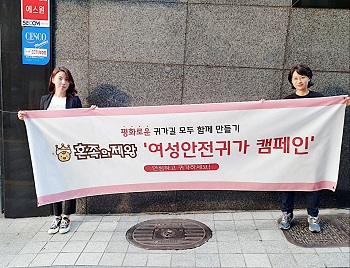By Choi Ye-jin, Yoon Chae-eun, Park Ju-won, Yang Nam-kyung

In the past 10 years, the number of women living alone has increased along with crimes targeted towards them. For example, in October, a 20-year-old man was arrested for breaking into two apartments, both of which targeted women living alone in Gangnam. Based on 2019 statistics released by the Seoul Metropolitan Government (SMG), one out of four households in Seoul is a single household, with women accounting for 53 percent of them. On top of that, there has been at least 300 trespassing reports leading to sexual crimes in the country in the last three years. To protect the safety of women, Ewha Voice investigated the actions led by government, universities, and private companies.
Government takes actions towards women’s safety
As concerns were raised by single household women, the government responded by implementing policies for their safety.
SMG introduced policies in several networks - environment safety networks, human safety network, traffic safety network, prevention-based countermeasures, and one-stop service for report and protection.
As part of the environment safety network, a mobile application was introduced by the government along with KT Corporation called Seoul Ansimi. This application launched in October 2018 after a trial period of about a year.
Ansimi works in a way where the city is monitored through over 30 thousand CCTVs planted in all districts. The cameras are then monitored by police officers and staff for 24 hours keeping track of any possible crimes at late hours.
“As of June 30, the app has a total of 102,000 users,” said Lee Young-chul from the Women’s Policy Division. “So far, we have received 24,561 reports, including accidental and trial calls. Among them, 7,503 were actual SOS calls.”
Through this app, people can file emergency reports including alleged stalking. It also has a service where one can request monitoring of their way back home at night.
When asked about successfully solved cases the Ansimi center received, Lee responded with a sexual harassment case reported at Eunpyeong-gu in June.
“On June 10, a sexual harassment case was reported in Eunpyeong-gu, which was monitored and filed through the app. We got the call and caught the alleged assaulter in 10 minutes.”
Lee also stated that the government is advertising this app in various ways through the radio, press, and banners at stations. He expressed his hopes that by using this app, women would feel safer in the city.
Other women support services created by SMG include the Safe Delivery for Women. This service provides a postbox located in a number of districts for women who feel uncomfortable with delivery men coming to their doorstep. Currently, there are more than 210 postboxes in the city.
“We located these postboxes at places most populated with single household women, near train stations, churches, and markets,” Lee added. “We also take requests from citizens at places they wish them to be located.”
Human safety network includes the scout for the safe return home for women, safety village for women, and village guards.
The scout service works in a way where two volunteers accompany the requester to their home. Requests can be made through the Ansimi app or through call, where scout volunteers will wait at the nearest bus or subway station 30 minutes prior to the estimated time of arrival.
“I came across the scout service via an advertisement at the subway,” said Park Chan-mi, a senior majoring in Consumer Studies. “I did feel less scared with two people walking alongside me, but they didn’t seem like professionals who could protect me in case something happens.”
Safe Singles Zone (SS Zone) is also part of a project run by SMG where a village guard is allocated at a certain area along with other safety services like Safe Delivery for Women. These zones are designated in areas where there is a high population of single household women and have high crime rates such as Gangbuk-gu and Gangdong-gu.
Furthermore, according to Kim Ji-hyun, an official from SMG, the city is constantly receiving ideas on allocating more SS Zones and other services.
Through various projects, the city is taking a step closer to creating a safer environment for women.
Honjokking holds campaigns for women to return home safely at night

Honjokking is a community platform which supports the culture of people enjoying their time individually. Jung Dan-bi, CEO of Honjokking, started running campaigns since April to promote a safe environment for women returning home late at night.
Jung explained that statistics by Seoul Foundation of Women & Family showed how single household women have been concerned about their safety for a long time. With this in mind, she started to think about the current campaign early this year.
“I specifically focused on providing a safe environment for women on their way home from the beginning of this year,” Jung said. “As taxi corporations were having conflicts with those of carpooling, I recognized many women pointing out doubts about the safety of taxis.”
The campaign consists of two parts: a funding event via Tumblbug and encouraging taxi drivers to provide a safe environment for women heading home at night.
Jung made leaflets providing guidelines on how taxi drivers could behave to make women feel safe when taking taxis at night. The guidelines included giving short explanations about the route to the destination and providing a prediction of the taxi fare.
Jung decided to change her plans when taxi corporations did not show much interest.
“We tried to visit taxi corporations to hand out leaflets we made, but they turned down the request,” Jung added.
Instead of contacting taxi companies, she is currently discussing the matter with carpooling corporations, which are gaining popularity at the moment.
“We decided to aim for drivers at carpooling corporations as the main audience for our campaign. We are thinking of handing out leaflets at briefing sessions drivers attend before starting their service.”
Universities and organizations’ efforts
On Sept. 4, Korean National Police Agency, Ministry of Education, Korean Council for University Education, and Korean Council for University College Education signed an MOU with Sookmyung Women’s University to ensure the students’ safety on campus as well as female pedestrians near the area.
“This MOU was signed between Korean National Police Agency and Ministry of Education,” said Seodaemun Police Officer Kim Ji-min. “We are also consistently patrolling nearby areas in Ewha Womans University and student boarding houses.”
As part of the Seodaemun-gu Gender Equality Support Fund Project, the district also joined with Ewha Womans University Welfare Center to create a safety network between women through a charity program.
The program was called Seodaemun W. Students were asked to educate and check the residential safety of elderly women, living alone. Any female student living alone in Seodaemun-gu were able to engage in this program.
The “W” from Seodaemun W means woman, and to live together, as the Korean pronunciation of “W” is similar to the pronunciation of “to live together."
Students were asked to visit the homes of the elderly and identify any possible risk factors. They suggested opinions such as “the broken doorknob can expose the home to criminals,” and many more. Following the feedback, the social workers prepared the required resources which improved the environments of a total of 14 homes. The supported elderly were also provided with safety supplies such as fire extinguishers, self-defense sprays and alarms, first aid kits, and more.
Moreover, the students visited them twice a month from June to October to keep them company and strengthen the safety-network they had created.

